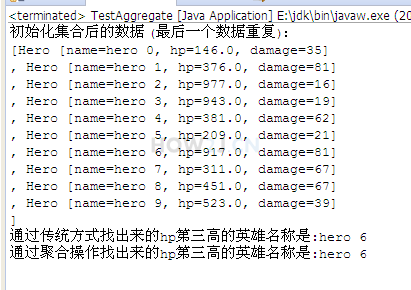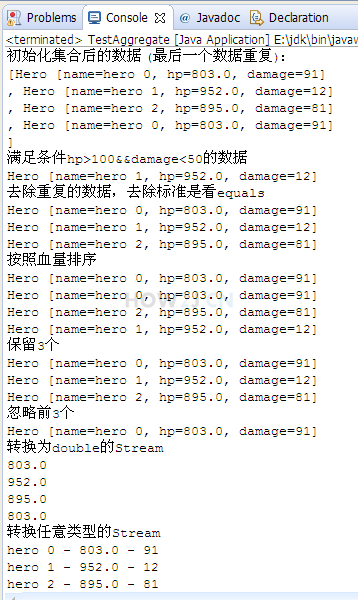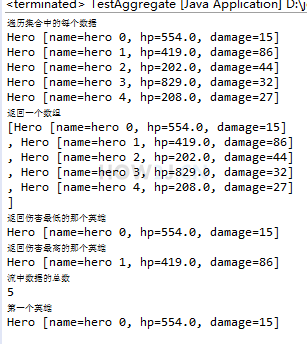java高级20- 聚合操作
1.聚合操作
JDK8之后,引入了对集合的聚合操作,可以非常容易的遍历,筛选,比较集合中的元素。
String name =heros
.stream()
.sorted((h1,h2)->h1.hp>h2.hp?-1:1)
.skip(2)
.map(h->h.getName())
.findFirst()
.get();public class TestAggregate {
public static void main(String[] args) {
Random r = new Random();
List heros = new ArrayList();
for (int i = 0; i < 10; i++) {
heros.add(new Hero("hero " + i, r.nextInt(1000), r.nextInt(100)));
}
System.out.println("初始化集合后的数据 (最后一个数据重复):");
System.out.println(heros);
//传统方式
Collections.sort(heros,new Comparator() {
@Override
public int compare(Hero o1, Hero o2) {
return (int) (o2.hp-o1.hp);
}
});
Hero hero = heros.get(2);
System.out.println("通过传统方式找出来的hp第三高的英雄名称是:" + hero.name);
//聚合方式
String name =heros
.stream()
.sorted((h1,h2)->h1.hp>h2.hp?-1:1)
.skip(2)
.map(h->h.getName())
.findFirst()
.get();
System.out.println("通过聚合操作找出来的hp第三高的英雄名称是:" + name);
}
}
2.传统方式与聚合操作方式遍历数据
传统方式
for (Hero h : heros) {
if (h.hp > 100 && h.damage < 50)
System.out.println(h.name);
}聚合操作方式
heros
.stream()
.filter(h -> h.hp > 100 && h.damage < 50)
.forEach(h -> System.out.println(h.name));public class TestAggregate {
public static void main(String[] args) {
Random r = new Random();
List heros = new ArrayList();
for (int i = 0; i < 5; i++) {
heros.add(new Hero("hero " + i, r.nextInt(1000), r.nextInt(100)));
}
System.out.println("初始化后的集合:");
System.out.println(heros);
System.out.println("查询条件:hp>100 && damage<50");
System.out.println("通过传统操作方式找出满足条件的数据:");
for (Hero h : heros) {
if (h.hp > 100 && h.damage < 50)
System.out.println(h.name);
}
System.out.println("通过聚合操作方式找出满足条件的数据:");
heros
.stream()
.filter(h -> h.hp > 100 && h.damage < 50)
.forEach(h -> System.out.println(h.name));
}
} 3.Stream和管道的概念
Stream 和Collection结构化的数据不一样,Stream是一系列的元素,就像是生产线上的罐头一样,一串串的出来。
管道指的是一系列的聚合操作。
管道又分3个部分
管道源:在这个例子里,源是一个List
中间操作: 每个中间操作,又会返回一个Stream,比如.filter()又返回一个Stream, 中间操作是“懒”操作,并不会真正进行遍历。
结束操作:当这个操作执行后,流就被使用“光”了,无法再被操作。所以这必定是流的最后一个操作。 结束操作不会返回Stream,但是会返回int、float、String、 Collection或者像forEach,什么都不返回, 结束操作才进行真正的遍历行为,在遍历的时候,才会去进行中间操作的相关判断。
3.1 管道源
把Collection切换成管道源很简单,调用stream()就行了。
heros.stream()但是数组却没有stream()方法,需要使用
Arrays.stream(hs)或者
Stream.of(hs)public class TestAggregate {
public static void main(String[] args) {
Random r = new Random();
List heros = new ArrayList();
for (int i = 0; i < 5; i++) {
heros.add(new Hero("hero " + i, r.nextInt(1000), r.nextInt(100)));
}
//管道源是集合
heros
.stream()
.forEach(h->System.out.println(h.name));
//管道源是数组
Hero hs[] = heros.toArray(new Hero[heros.size()]);
Arrays.stream(hs)
.forEach(h->System.out.println(h.name));
}
} 3.2 中间操作
每个中间操作,又会返回一个Stream,比如.filter()又返回一个Stream, 中间操作是“懒”操作,并不会真正进行遍历。
中间操作比较多,主要分两类
对元素进行筛选 和 转换为其他形式的流
对元素进行筛选:
filter 匹配
distinct 去除重复(根据equals判断)
sorted 自然排序
sorted(Comparator
limit 保留
skip 忽略
转换为其他形式的流
mapToDouble 转换为double的流
map 转换为任意类型的流
public class Hero implements Comparable{
public String name;
public float hp;
public int damage;
public Hero(){
}
public String getName() {
return name;
}
public void setName(String name) {
this.name = name;
}
public float getHp() {
return hp;
}
public void setHp(float hp) {
this.hp = hp;
}
public int getDamage() {
return damage;
}
public void setDamage(int damage) {
this.damage = damage;
}
public Hero(String name) {
this.name =name;
}
//初始化name,hp,damage的构造方法
public Hero(String name,float hp, int damage) {
this.name =name;
this.hp = hp;
this.damage = damage;
}
@Override
public int compareTo(Hero anotherHero) {
if(damage public class TestAggregate {
public static void main(String[] args) {
Random r = new Random();
List heros = new ArrayList();
for (int i = 0; i < 5; i++) {
heros.add(new Hero("hero " + i, r.nextInt(1000), r.nextInt(100)));
}
//制造一个重复数据
heros.add(heros.get(0));
System.out.println("初始化集合后的数据 (最后一个数据重复):");
System.out.println(heros);
System.out.println("满足条件hp>100&&damage<50的数据");
heros
.stream()
.filter(h->h.hp>100&&h.damage<50)
.forEach(h->System.out.print(h));
System.out.println("去除重复的数据,去除标准是看equals");
heros
.stream()
.distinct()
.forEach(h->System.out.print(h));
System.out.println("按照血量排序");
heros
.stream()
.sorted((h1,h2)->h1.hp>=h2.hp?1:-1)
.forEach(h->System.out.print(h));
System.out.println("保留3个");
heros
.stream()
.limit(3)
.forEach(h->System.out.print(h));
System.out.println("忽略前3个");
heros
.stream()
.skip(3)
.forEach(h->System.out.print(h));
System.out.println("转换为double的Stream");
heros
.stream()
.mapToDouble(Hero::getHp)
.forEach(h->System.out.println(h));
System.out.println("转换任意类型的Stream");
heros
.stream()
.map((h)-> h.name + " - " + h.hp + " - " + h.damage)
.forEach(h->System.out.println(h));
}
} 3.3 结束操作
当进行结束操作后,流就被使用“光”了,无法再被操作。所以这必定是流的最后一个操作。 结束操作不会返回Stream,但是会返回int、float、String、 Collection或者像forEach,什么都不返回,。
结束操作才真正进行遍历行为,前面的中间操作也在这个时候,才真正的执行。
常见结束操作如下:
forEach() 遍历每个元素
toArray() 转换为数组
min(Comparator
max(Comparator
count() 总数
findFirst() 第一个元素
public class TestAggregate {
public static void main(String[] args) {
Random r = new Random();
List heros = new ArrayList();
for (int i = 0; i < 5; i++) {
heros.add(new Hero("hero " + i, r.nextInt(1000), r.nextInt(100)));
}
System.out.println("遍历集合中的每个数据");
heros
.stream()
.forEach(h->System.out.print(h));
System.out.println("返回一个数组");
Object[] hs= heros
.stream()
.toArray();
System.out.println(Arrays.toString(hs));
System.out.println("返回伤害最低的那个英雄");
Hero minDamageHero =
heros
.stream()
.min((h1,h2)->h1.damage-h2.damage)
.get();
System.out.print(minDamageHero);
System.out.println("返回伤害最高的那个英雄");
Hero mxnDamageHero =
heros
.stream()
.max((h1,h2)->h1.damage-h2.damage)
.get();
System.out.print(mxnDamageHero);
System.out.println("流中数据的总数");
long count = heros
.stream()
.count();
System.out.println(count);
System.out.println("第一个英雄");
Hero firstHero =
heros
.stream()
.findFirst()
.get();
System.out.println(firstHero);
}
}


